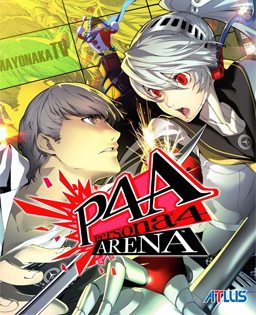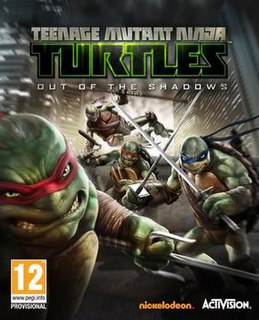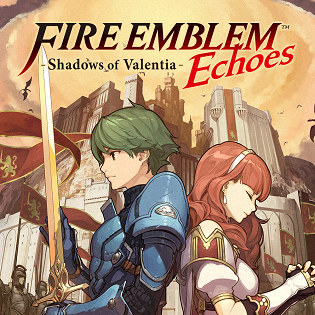Massively multiplayer online role-playing games (MMORPGs) are a combination of role-playing video games and massively multiplayer online games in which a very large number of players interact with one another within a virtual world.
Fire Emblem is a fantasy tactical role-playing game franchise developed by Intelligent Systems and published by Nintendo. First produced and published for the Family Computer (Famicom), the series consists of fifteen main games and three spin-offs. Described by its creators as a "role-playing game simulation", the gameplay revolves around tactical movement of characters across grid-based environments, while incorporating a story and characters similar to traditional role-playing video games.

In video gaming, a fan translation is an unofficial translation of a video game made by fans.

The Precursors is a video game from Ukrainian developer Deep Shadows. It was released on the 4 December 2009 as retail for the PC in Russia. and in December 2010 via digital distribution by GamersGate in an English version. It was also available for purchase via online retailer Beamdog. The game is set in a futuristic sci-fi environment where many political factions are engaged in an intergalactic war. The player will be able to explore a multitude of planets, travel through outer space to complete missions, obtain information, and buy weapons and supplies in a free-roaming environment. "The game blends role-playing engagement and dynamic FPS-style action in a completely open world".
1991 has seen many sequels and prequels in video games and several new titles such as Mega Man 4, The Legend of Zelda: A Link to the Past and Sonic the Hedgehog.

GameFront is a video game website that provides patches, demos, modifications, and other user generated game related content to users. On April 14, 2016, GameFront announced that the site would be shutting down on April 30, 2016. The GameFront file service was later recreated.

Pool of Radiance: Ruins of Myth Drannor is a Forgotten Realms Dungeons & Dragons role-playing video game released in 2001 by Ubisoft.

Quest for Glory: Shadows of Darkness is an adventure game/role-playing video game hybrid. It is the fourth installment of the Quest for Glory computer game series by Sierra On-Line. It was the first and only game of the series to drop the numerals from the title.

Samurai Jack: The Shadow of Aku is an action-adventure video game released in 2004 by Adrenium Games and published by Sega, in co-production with Warner Bros. Interactive Entertainment and Cartoon Network Interactive and based on the Samurai Jack animated television series on Cartoon Network. The series' original voice actors, including Phil LaMarr, Mako Iwamatsu, Jeff Bennett, John DiMaggio, and Jennifer Hale, reprised their respective roles for the game. The game was released for the PlayStation 2 and Nintendo GameCube. An Xbox version of the game was planned, but never released, even though it received "mixed" reviews according to the review aggregation website Metacritic.
Shelby Young is an American actress known for her roles in American Horror Story, The Social Network, Nightlight, and Star Wars Forces of Destiny.

SimCity is a city-building and urban planning simulation massively multiplayer online game developed by Maxis, a subsidiary of Electronic Arts. Released for Microsoft Windows in early March 2013, it is the first major installment in the SimCity series since the release of SimCity 4 a decade prior. An OS X version was released on August 29, 2013.

Echochrome, released in Japan as Mugen Kairō (無限回廊), is a puzzle game created by Sony's Japan Studio and Game Yarouze, which is available for PlayStation 3 from the PlayStation Store and for PlayStation Portable (PSP) on either UMD or from the PlayStation Store. Gameplay involves a mannequin figure traversing a rotatable world where physics and reality depend on perspective. The world is occupied by Oscar Reutersvärd's impossible constructions. This concept is inspired by M. C. Escher's artwork, such as "Relativity". The game is based on the Object Locative Environment Coordinate System developed by Jun Fujiki—an engine that determines what is occurring based on the camera's perspective.

Sacred 2: Fallen Angel is an action role-playing game. It is the second full game in the Sacred video game series. It is a prequel which takes place 2,000 years before the events of Sacred. Like its predecessor, the game takes place in a fantasy setting. A new game engine allows the game to be rendered in perspective correct 3D, while retaining the viewpoint found in older isometric games. Video game designer Bob Bates was involved in its production. Power metal band Blind Guardian wrote the song "Sacred Worlds" as the theme for the game and also make an appearance as characters.
Killzone is a series of first-person shooter and twin sticks shooter video games for Sony Computer Entertainment's (SCE) video game consoles. The main series and the PlayStation Portable (PSP) installment were developed by Guerrilla Games, a subsidiary of SCE, and the PlayStation Vita installment was developed by Guerrilla Cambridge. Killzone consists of six games, beginning on the PlayStation 2 in November 2004 with Killzone, and continued on the PlayStation Portable in October 2006 with Killzone: Liberation. Killzone 2 was released for the PlayStation 3 in February 2009, and Killzone 3 was released in February 2011, also for the PlayStation 3. Killzone: Mercenary was released for the PlayStation Vita in September 2013, followed by Killzone Shadow Fall, a launch title for the PlayStation 4, in November 2013.

Persona 4 Arena is a fighting video game co-developed by Atlus and Arc System Works for arcades, PlayStation 3, and Xbox 360. Based on Atlus' Persona role-playing video game series, Arena serves as a direct sequel to the 2008 game, Persona 4, additionally featuring characters from its predecessor, Persona 3.

Ciel Nosurge, full name Surge Concerto: Ciel nosurge is a life simulation video game for the PlayStation Vita developed by Gust. The player's objective is to help Ion, a girl with amnesia, regain her memories by entering her mind, which is shown as a broken world which the player can repair. Although not a continuation of the Ar tonelico series, it takes place in the same universe with many of the same elements and expands on the series mythos. The game was notably the first game to be developed by Gust after their merger with Tecmo Koei.
Always-on DRM or always-online DRM is a form of DRM that requires a consumer to remain connected to a server, especially through an internet connection, to use a particular product. The practice is also referred to as persistent online authentication. The technique is meant to prevent copyright infringement of software. Like other DRM methods, always-on DRM has proven controversial, mainly because it has failed to stop pirates from illegally using the product, while causing severe inconvenience to people who bought the product legally.

Teenage Mutant Ninja Turtles: Out of the Shadows is a 2013 hack and slash video game developed by Red Fly Studio and published by Activision based on the Mirage Studios characters of the same name.

Fire Emblem Echoes: Shadows of Valentia is a tactical role-playing game developed by Intelligent Systems and published by Nintendo for the Nintendo 3DS handheld video game console in 2017. The game is the fifteenth game in the Fire Emblem series. It is a remake of the 1992 Famicom title Fire Emblem Gaiden. It follows dual protagonists Alm and Celica as they aim to bring an end to the war through opposite methods, with Alm fighting to resolve the war through battle, while Celica attempts to find a peaceful end through guidance from the Goddess Mila. Fire Emblem Echoes carries over the core gameplay mechanics of the Fire Emblem series while incorporating mechanics from Gaiden like dungeon crawling.













